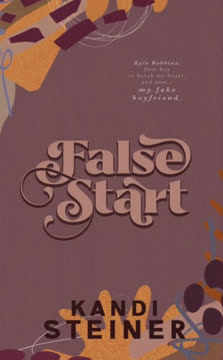Plot Summary
Homecoming of Old Wounds
Emerson "Emmy" Hughes, a sharp, driven New Yorker, returns to Elliott Springs, California, to oversee a redevelopment project and care for her mother after surgery. The town is picturesque but filled with memories of cruelty and exclusion from her youth, especially regarding her weight and strained family dynamics. Her mother's coldness and the town's small-mindedness immediately reignite old insecurities. Emmy's return is not just a business trip—it's a confrontation with the ghosts of her adolescence, and she's determined to reshape the town that once broke her, even if it means destroying what others hold dear.
Small Town, Big Plans
Emmy's project aims to modernize Elliott Springs, replacing its quaint businesses with upscale stores and apartments. She's met with skepticism and subtle hostility from locals, especially those who fear losing the town's character. Her boss, Charles, pressures her for results, and Emmy's perfectionism drives her to micromanage every detail. The town's resistance is personified by Liam Doherty, a contractor with deep roots in Elliott Springs, who wants to preserve its history. Their professional relationship is fraught with tension, but beneath the surface, a mutual fascination grows, setting the stage for a battle between progress and preservation.
Ghosts of High School
As Emmy moves through town, she encounters former classmates and bullies, including Bradley Grimm, her ex-best friend turned nemesis. The memories of relentless teasing, public humiliation, and her mother's constant criticism about her weight resurface, making every interaction a minefield. Emmy's internal monologue reveals the scars left by years of being the "fat girl," and her drive for success is revealed as a coping mechanism. The town's collective memory is long, and Emmy realizes that, despite her transformation, she's still fighting to prove her worth to people who never valued her.
Enemies, Allies, and Texts
Emmy's only respite comes from witty, flirtatious text exchanges with Liam, who, unbeknownst to her at first, is the same "yard boy" she spars with in person. Their banter is laced with sarcasm and sexual tension, but in person, misunderstandings and pride keep them at odds. Both are drawn to each other's strength and vulnerability, but their shared history—unknown to them at first—complicates things. As they clash over construction mishaps and project delays, their mutual attraction becomes harder to ignore, blurring the lines between enemy and ally.
The Weight of Words
Emmy's relationship with her mother is toxic, defined by constant jabs about her appearance and worth. Flashbacks reveal how her mother's disdain fueled Emmy's disordered eating and self-loathing. Even as an adult, Emmy can't escape the voice in her head telling her she's not enough. The struggle to assert her independence is ongoing, and every meal, every glance in the mirror, is a battle. The emotional weight of her mother's words is heavier than any physical burden, and Emmy's journey is as much about healing from this as it is about professional success.
Collisions and Ceilings
A construction error in the town theater—wrong ceiling tiles installed—becomes a flashpoint between Emmy and Liam. Emmy suspects Liam manipulated the situation, while Liam is frustrated by her assumptions. Their professional conflict mirrors their personal struggles: both are trying to prove themselves, both are haunted by past failures. The incident forces them to confront their perceptions of each other, and a grudging respect begins to form. Meanwhile, Emmy's assistant reveals that Liam is the owner of the construction company, not just a worker, complicating Emmy's feelings and challenging her assumptions.
Family Ties, Family Lies
Emmy's family is a web of secrets and resentments. Her mother's favoritism toward Emmy's brother, Jeff, and her dismissiveness toward Emmy are rooted in deeper betrayals. As Emmy digs into the past, she uncovers hints that her father's disappearance and her mother's bitterness are connected to more than just marital strife. The town's gossip and her own memories suggest that the truth about her family—and her own identity—is more complicated than she realized. These revelations force Emmy to question everything she thought she knew about herself and her place in Elliott Springs.
Rivalry on Main Street
The fate of Lucas Hall, the town's historic centerpiece, becomes the battleground for Emmy and Liam's competing visions. Emmy's plan to replace it with luxury apartments is met with fierce opposition from Liam, who proposes restoring it as a hotel to preserve its legacy. The town council hearing is a public showdown, with Emmy's polished presentation winning over many, but Liam's heartfelt plea resonating with those who value tradition. The rivalry is personal as well as professional, and the outcome will determine not just the town's future, but Emmy and Liam's relationship.
Hunger and Defiance
Emmy's lifelong battle with hunger—literal and metaphorical—mirrors her quest for control. Her mother's policing of her eating habits is internalized, leading to cycles of restriction and rebellion. Food becomes both comfort and weapon, a way to assert autonomy in a world that constantly tries to diminish her. As Emmy gains power in her professional life, she begins to challenge the narratives imposed on her, but the old wounds are slow to heal. Her defiance is both a survival strategy and a cry for validation.
The Lucas Hall Showdown
The town council's decision on Lucas Hall is a turning point. Emmy's corporate backers demand results, while Liam's supporters rally to save the building. The hearing exposes the town's divisions and the personal stakes for everyone involved. Emmy is forced to confront the consequences of her actions—not just for the town, but for herself. The outcome is uncertain, and both Emmy and Liam must decide what they're willing to sacrifice for their principles, their ambitions, and each other.
Sandbags and Second Chances
When a storm threatens to flood Main Street, Emmy and Liam join forces to protect the town. The physical labor and shared purpose break down barriers between them, revealing their true selves. In the aftermath, they find solace in each other, and their relationship shifts from adversarial to intimate. The crisis serves as a metaphor for the possibility of renewal and forgiveness, both for the town and for Emmy's wounded heart. It's a moment of grace that hints at the potential for healing and change.
The Truth in Ruins
As the dust settles, Emmy uncovers the truth about her father's disappearance, her connection to Bradley, and the real reasons behind her mother's cruelty. The revelation that she and Bradley are half-sisters, and that their rivalry was fueled by adult betrayals, reframes Emmy's understanding of her past. The discovery of a lockbox from her father, filled with mementos and a message of love, offers closure and a new sense of self-worth. The ruins of the past become the foundation for a new beginning.
The Price of Revenge
With her professional goals within reach, Emmy is forced to reckon with the collateral damage of her ambition. Destroying her enemies and reshaping the town has not brought the satisfaction she expected. The emptiness she feels is a reminder that revenge cannot heal old wounds. Her relationship with Liam, now deepened by vulnerability and trust, becomes the true measure of her success. Emmy must decide whether to continue down a path of destruction or to choose a different kind of triumph—one rooted in connection and forgiveness.
Unraveling the Past
Emmy faces her mother, Bradley, and the town with newfound clarity. Difficult conversations reveal the pain and misunderstandings that shaped their lives. Emmy learns to set boundaries, refusing to let her mother's bitterness define her. Her truce with Bradley is uneasy but necessary, as both women acknowledge the ways they were hurt and the ways they hurt each other. The process is messy and incomplete, but it marks the beginning of true healing. Emmy's willingness to forgive—herself and others—signals a shift from survival to growth.
The Breaking Point
As Emmy and Liam grow closer, their fears and insecurities threaten to pull them apart. Emmy's reluctance to trust, born of years of betrayal, clashes with Liam's desire for openness and commitment. Misunderstandings and jealousy flare, but their connection proves resilient. Through honest communication and mutual support, they learn to navigate the complexities of love and vulnerability. The breaking point becomes a breakthrough, as both realize that true intimacy requires letting go of the past.
Choosing Sides
The last town council meeting is a culmination of all the battles fought—personal, professional, and emotional. Emmy, moved by Liam's selflessness and the town's resilience, makes a surprising decision: she uses her influence to save Lucas Hall, sacrificing her own ambitions for the greater good. The gesture is both an act of love and a declaration of belonging. In choosing the town—and Liam—over revenge, Emmy reclaims her agency and finds a sense of peace she never thought possible.
Forgiveness and Fresh Starts
With the past finally laid to rest, Emmy embraces a new chapter. She reconciles with her half-sister, finds closure with her mother, and commits to building a life with Liam in Elliott Springs. The town, once a symbol of pain, becomes a place of possibility. Emmy's journey from outsider to insider mirrors her internal transformation—from self-doubt to self-acceptance, from isolation to connection. The fresh start is hard-won, but all the more meaningful for it.
Love, Loss, and Lucas Hall
The restoration of Lucas Hall becomes a metaphor for Emmy and Liam's relationship: honoring the past while building something new. Together, they create a space that reflects both tradition and progress, community and individuality. The losses they've endured—of family, innocence, and certainty—are woven into the fabric of their new life. In choosing each other, Emmy and Liam prove that love is not about erasing the past, but about transforming it into something beautiful and enduring.
Characters
Emerson "Emmy" Hughes
Emmy is a complex protagonist shaped by childhood trauma, bullying, and a toxic mother. Her drive for success is both a shield and a weapon, protecting her from vulnerability but also isolating her. Emmy's relationships are marked by defensiveness and sarcasm, but beneath her armor lies a deep longing for acceptance and love. Her journey is one of self-discovery, as she learns to confront her past, forgive herself, and open up to the possibility of happiness. Emmy's development is a testament to the resilience of the human spirit and the transformative power of connection.
Liam Doherty
Liam is the moral center of the story, rooted in his love for Elliott Springs and its history. His easygoing exterior masks a deep well of loyalty and integrity. Liam's own setbacks—a career-threatening injury, failed dreams—have made him empathetic and patient. His attraction to Emmy is both physical and emotional; he sees through her defenses and challenges her to be her best self. Liam's willingness to forgive and his capacity for love are catalysts for Emmy's healing. His arc is about learning to fight for what matters, even when it means letting go.
Sandra Atwell (Emmy's Mother)
Sandra is a master of subtle cruelty, using backhanded compliments and constant criticism to undermine Emmy's confidence. Her own disappointments and bitterness are projected onto her daughter, creating a cycle of pain. Sandra's inability to show love or pride in Emmy is both a source of trauma and a challenge for Emmy to overcome. While she is not redeemed, her role is crucial in understanding Emmy's psychological landscape and the generational patterns of hurt.
Bradley Grimm
Once Emmy's best friend, Bradley becomes her chief tormentor, orchestrating much of the bullying that defines Emmy's adolescence. Her cruelty is later revealed to be rooted in her own pain—discovering that she and Emmy are half-sisters, and feeling abandoned by their shared father. Bradley's actions are unforgivable, but her motivations are complex, shaped by loss, jealousy, and a sense of injustice. The uneasy truce she forms with Emmy is a step toward breaking the cycle of revenge.
Charles (Emmy's Boss)
Charles is the voice of the faceless corporation, pushing Emmy to deliver results at any cost. He takes credit for her successes and blames her for setbacks, embodying the toxic work culture that values profit over people. His presence in the story heightens Emmy's stress and sense of isolation, but also sharpens her resolve to prove herself. Charles is a foil to Liam's integrity, highlighting the choices Emmy must make between ambition and authenticity.
Jeff (Emmy's Brother)
Jeff is the golden child, enjoying their mother's approval and escaping the scrutiny that plagues Emmy. His complicity in their mother's cruelty—laughing at Emmy's expense, siding with Sandra—deepens Emmy's sense of betrayal. Jeff's inability to see or challenge the family dynamic is a reminder of how easy it is to perpetuate harm by doing nothing.
Stella (Emmy's Assistant)
Stella is Emmy's right hand, managing logistics and providing a sounding board for her frustrations. Her loyalty is unwavering, and she often acts as Emmy's conscience, gently challenging her when she goes too far. Stella's presence is a stabilizing force, offering practical help and emotional support without judgment.
Beverly Grimm (Bradley's Mother)
Beverly's affair with Emmy's father and subsequent abandonment shape both her and Bradley's lives. Forced to raise her daughter alone, she becomes hardened and bitter, projecting her anger onto Emmy. Beverly's revelations about the past provide crucial context for the story's central conflicts, illustrating how adult choices reverberate through generations.
Damien Ellis
Damien is the successful developer whose interest in Emmy's work offers her a path to professional advancement. His presence tests Emmy's priorities and loyalty, forcing her to choose between ambition and integrity. While not a romantic rival, Damien represents the allure of escape and the temptation to define oneself solely by achievement.
Jeannie (Diner Owner)
Jeannie is a minor but significant character, embodying the warmth and endurance of small-town life. Her diner is a gathering place, and her struggles to keep it afloat mirror the town's fight for survival. Jeannie's kindness to Emmy, even after being targeted by her redevelopment plans, is a lesson in forgiveness and the importance of community.
Plot Devices
Dual Timelines and Flashbacks
The narrative weaves together Emmy's present-day challenges with flashbacks to her traumatic adolescence. These glimpses into the past provide context for her actions and attitudes, allowing readers to understand the depth of her wounds. The dual timelines also create suspense, as secrets are gradually revealed and the connections between characters become clear.
Enemies-to-Lovers Romance
The central relationship between Emmy and Liam is built on opposition—professional, personal, and ideological. Their banter, misunderstandings, and eventual intimacy are fueled by their differences, but also by a shared sense of isolation and longing. The romance is a vehicle for both characters' development, forcing them to confront their fears and learn to trust.
Small-Town Microcosm
The town itself is more than a setting; it's a living, breathing entity with its own history, values, and conflicts. The battle over Lucas Hall is a metaphor for the struggle between progress and preservation, individual ambition and collective memory. The town's insularity both traps and protects its residents, making it the perfect stage for Emmy's journey of self-discovery.
Secrets and Revelations
The story is propelled by secrets—about family, identity, and the past. Each revelation forces characters to reevaluate their assumptions and choices. The gradual unspooling of these secrets creates tension and emotional payoff, culminating in moments of catharsis and transformation.
Symbolism of Food and Hunger
Emmy's relationship with food is a recurring motif, symbolizing her struggle for autonomy and self-acceptance. Meals are battlegrounds, acts of defiance, and moments of vulnerability. The motif extends to other forms of hunger—emotional, sexual, and existential—underscoring the story's themes of longing and fulfillment.
Redemption and Forgiveness
The narrative arc is one of redemption—not just for Emmy, but for the town, her family, and even her enemies. Forgiveness is hard-won, requiring honesty, empathy, and the willingness to let go of old grievances. The story suggests that true healing is possible only when we face the truth and choose compassion over vengeance.
Analysis
Elizabeth O'Roark's The Summer I Destroyed You is a nuanced exploration of the long shadow cast by childhood trauma, the corrosive effects of shame, and the redemptive power of love and community. Through Emmy's journey, the novel interrogates the ways we internalize the judgments of others and the difficulty of breaking free from narratives imposed on us by family and society. The enemies-to-lovers romance is not just a trope, but a vehicle for deep psychological healing, as Emmy and Liam challenge each other to confront their fears and rewrite their stories. The book's modern relevance lies in its unflinching portrayal of body image issues, toxic family dynamics, and the complexities of forgiveness. O'Roark suggests that true victory is not found in revenge or professional triumph, but in the courage to be vulnerable, to forgive, and to choose connection over isolation. The restoration of Lucas Hall is both literal and symbolic—a testament to the possibility of honoring the past while building a better future. Ultimately, the novel is a call to compassion, urging readers to see beyond surface judgments and to recognize the humanity in themselves and others.
Last updated:
Review Summary
The Summer I Destroyed You received mostly positive reviews, with readers praising the complex characters, witty banter, and emotional depth. Many appreciated the portrayal of Emmy's journey from a bullied teenager to a successful but guarded woman seeking revenge. Liam was lauded as a patient, supportive love interest. Some readers found Emmy unlikeable or the story too heavy, but most enjoyed the romantic development and character growth. The book tackles themes of bullying, body image, and self-acceptance, resonating with many readers despite its sometimes difficult subject matter.
















